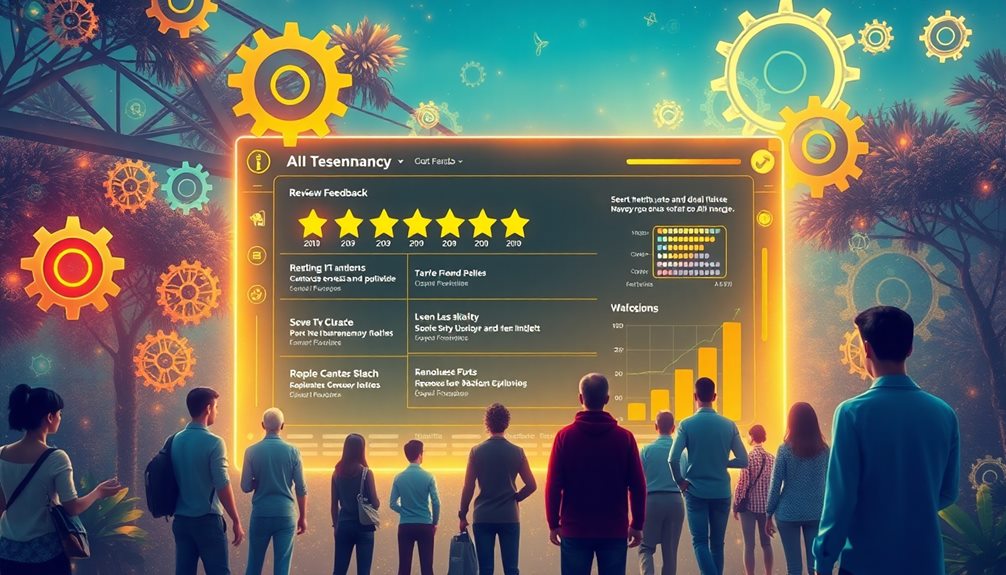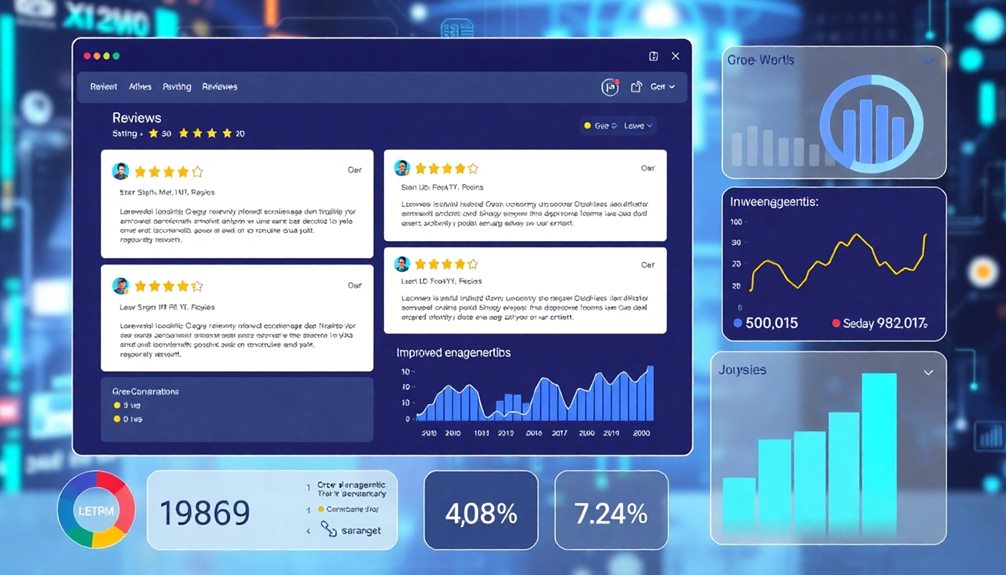Making Money Online
Freelance Writers: Here's How to Get Published Online in Top Magazines
Master the art of pitching and networking to land your articles in top magazines online – discover expert strategies to elevate your freelance writing career.

Looking to get published in top magazines online? Research publications that match your style. Create personalized pitches with strong hooks. Build a diverse writing portfolio showcasing your expertise. Network with editors at industry events and on social media. Follow submission guidelines closely for each magazine. Guarantee professionalism in your communication. Boost visibility with a professional website, social media presence, and guest blogs. Want to know more ways to maximize your chances of getting published by top magazines?
Key Takeaways
- Research target publications aligned with your writing style and content expertise.
- Craft personalized and compelling pitches tailored to each publication.
- Network with editors and showcase your expertise through industry events and social media.
- Familiarize yourself with submission guidelines and adhere to them professionally.
- Enhance visibility through online platforms like a professional website and social media engagement.
Research Target Publications

To increase your chances of getting published online in top magazines, start by researching target publications that align with your writing style and content. Look for magazines that cater to your niche or genre, as they're more likely to be interested in your work. Consider the tone, topics, and overall vibe of the publication to ensure your writing fits their editorial style.
When researching potential magazines, explore their archives to get a feel for the type of content they publish. Pay attention to the writers they feature and the kind of articles that receive the most engagement. This will help you tailor your pitches to align with what the magazine is looking for.
Furthermore, investigate the submission guidelines of each magazine you're interested in. Familiarize yourself with their preferred word count, formatting requirements, and submission process. Adhering to these guidelines shows editors that you respect their publication and increases the likelihood of your work being considered.
Craft Compelling Pitches

Crafting compelling pitches for your writing submissions is necessary to capture the attention of editors and increase your chances of getting published in top magazines. When crafting your pitch, make sure to personalize it for each publication. Editors receive numerous pitches daily, so standing out is pivotal.
Start with a strong hook that grabs the editor's attention right away. Clearly outline your article idea, including the angle or unique perspective you plan to take. Highlight why your piece would be a great fit for their publication and audience.
Keep your pitch concise and to the point. Editors are busy, so a clear and well-structured pitch is more likely to be read and considered. Avoid being too wordy or including unnecessary details.
Showcase your writing style within the pitch itself by ensuring it's well-written and free of errors. Finally, don't forget to follow each publication's submission guidelines carefully. Tailoring your pitches to each magazine will demonstrate your professionalism and dedication to your craft.
Develop a Strong Portfolio

To develop a strong portfolio for online magazines, showcase a range of writing styles and topics to demonstrate your versatility.
Highlight relevant experience such as previous publications, writing awards, or relevant education to showcase your expertise in the field.
Showcase Diverse Writing
Highlight your versatility as a writer by showcasing a diverse range of writing styles and topics in your portfolio. Including a variety of genres, such as articles, essays, blog posts, and even fiction pieces, can demonstrate your flexibility and ability to adapt to different writing requirements.
Covering topics across various industries or interests will showcase your ability to research and write about a wide array of subjects. This diversity not only highlights your skills but also shows potential clients and publications that you can bring a fresh perspective to different types of content.
Moreover, incorporating different tones and voices in your writing samples can further exhibit your capabilities as a writer. For instance, including pieces that range from informative and professional to light-hearted and conversational can demonstrate your proficiency in adapting your writing style to suit different audiences and purposes.
Highlight Relevant Experience
Developing a strong portfolio is essential for showcasing your relevant experience and expertise to potential clients and publications. When highlighting your experience, focus on pieces that align with the topics and style of the magazines you want to write for.
Include a variety of writing samples to demonstrate your versatility, covering different formats such as articles, blog posts, or essays. Tailor your portfolio to showcase pieces that reflect the tone and voice of the magazines you're targeting.
Additionally, consider including any relevant education, certifications, or training that support your expertise in specific subject areas. If you have previously been published in well-known magazines or websites, be sure to prominently feature these accomplishments in your portfolio.
Remember to keep your portfolio updated with your latest work to provide a current representation of your writing skills. By highlighting your relevant experience in a concise and organized manner, you can make a strong impression on potential clients and increase your chances of getting published in top magazines.
Network With Editors

Connect with editors through professional networking events and online platforms to increase your chances of getting published in top magazines. Building relationships with editors can open doors for your writing to be featured in prestigious publications.
Attend industry conferences, workshops, and meetups where editors might be present. Engage in conversations, ask insightful questions, and exchange contact information to establish a connection.
Utilize social media platforms like LinkedIn to connect with editors and follow their work. Engaging with their posts, sharing relevant content, and sending personalized messages can help you stand out and create a lasting impression.
Join writing groups and online communities where editors actively participate. Offer value by sharing your expertise, providing feedback on their work, and showing genuine interest in their projects.
Understand Submission Guidelines

To increase your chances of getting published in top magazines, familiarize yourself with and adhere to their submission guidelines. Each magazine has specific requirements for submissions, so take the time to carefully read and understand what they're looking for. Submission guidelines typically outline the preferred word count, writing style, formatting, and submission process. Some magazines may have specific themes or topics they're interested in, so tailor your pitches accordingly.
Following the submission guidelines demonstrates your professionalism and respect for the publication's editors. It shows that you can follow instructions and are serious about your work. Ignoring the guidelines can result in automatic rejection, as it indicates a lack of attention to detail and a disregard for the publication's standards.
Before submitting your work, double-check that it meets all the requirements outlined in the guidelines. This includes proofreading for errors, ensuring it fits the specified word count, and following any formatting instructions.
Hone Your Writing Skills

Improving your writing skills is essential for increasing your chances of getting published in top magazines. To stand out in the competitive world of freelance writing, you must continuously work on honing your craft. Start by reading extensively across various genres and styles to broaden your knowledge and understanding of effective writing techniques. Pay attention to the structure, tone, and vocabulary used in articles published by the magazines you aspire to write for.
Practice regularly by setting aside time to write consistently. Experiment with different writing prompts and styles to discover your strengths and areas for improvement. Seek feedback from peers, mentors, or writing communities to gain valuable insights into how you can enhance your writing further.
Additionally, consider taking writing courses or workshops to develop specific skills or learn new writing approaches. Remember that writing is a skill that can always be refined and improved upon. By dedicating time and effort to hone your writing skills, you'll be better equipped to create compelling content that captures the attention of top magazine editors.
Utilize Online Platforms

Enhance your chances of getting published in top magazines by leveraging online platforms to showcase your writing skills and connect with potential editors. Online platforms play an essential role in the modern publishing landscape, providing opportunities for writers to reach a wider audience and establish their credibility.
Here's how you can effectively utilize online platforms:
- Create a Professional Website: Build a personal website to showcase your portfolio, writing samples, and contact information in one centralized location. This serves as a digital resume for editors to review your work.
- Engage on Social Media: Utilize social media platforms like Twitter, LinkedIn, and Instagram to share your writing, engage with other writers and editors, and stay updated on industry trends.
- Guest Blogging: Contribute guest posts to reputable websites and blogs within your niche. This not only expands your reach but also demonstrates your expertise to potential editors.
- Join Online Writing Communities: Participate in online writing forums, Facebook groups, or writing workshops to network with fellow writers, receive feedback, and discover new opportunities for publication.
Frequently Asked Questions
How Can I Maintain a Work-Life Balance While Freelancing?
To maintain a work-life balance while freelancing, prioritize tasks, set boundaries, schedule breaks, and communicate openly with clients. Remember to take care of yourself, both mentally and physically, and don't hesitate to seek support when needed.
Should I Disclose My Rates in Initial Pitches?
Thinking of disclosing your rates in initial pitches? Hold on! Let the mystery unfold slowly. Engage them first. Reveal your worth once they're hooked. Keep them craving more. Play the game wisely.
Is It Advisable to Follow up With Editors After Submission?
After submission, it's advisable to follow up with editors courteously. A brief, polite email to inquire about the status of your submission can show professionalism and interest. Timing is key; wait a reasonable period before following up.
How Do I Handle Rejection From Top Magazines?
Receiving rejections from top magazines is tough. Remember, it's part of the process. Take a moment to process your feelings, then revise your piece or submit elsewhere. Keep pushing forward; persistence pays off.
What Are the Best Practices for Negotiating Payment Terms?
When negotiating payment terms, remember that your time and talent are valuable. Be confident but flexible. Aim for a win-win situation where both parties feel satisfied. Clear communication and professionalism are key.
Conclusion
Now that you've armed yourself with the tools to conquer the online publishing world, it's time to plunge headfirst and make a splash. Remember, like a skilled surfer riding the wave of opportunity, your writing can take you to new heights.
So keep honing your craft, making connections, and crafting compelling pitches. Before you know it, you'll be riding the crest of success in top magazines.
Go ahead, make a splash!
Making Money Online
AI Optimization of Reviews for Better Conversions and Reader Engagement
Curious about how AI can transform your reviews into powerful tools for boosting conversions and engagement? Discover the secrets to success that await you!

AI optimization of reviews boosts your conversions and reader engagement by analyzing customer feedback through advanced techniques. By using sentiment analysis, you can gauge emotions and identify key themes that matter most to your audience. Streamlined display techniques enhance readability, while personalization makes interactions more relevant. Trust builds as you transparently showcase both positive and negative reviews. All these strategies can lead to significant increases in customer satisfaction and loyalty. With proven success in various industries, the potential for growth is immense. Stick around, and you'll discover even more ways to elevate your review strategy.
Key Takeaways
- AI-driven sentiment analysis identifies emotional tones in reviews, providing actionable insights to enhance customer engagement and conversion rates.
- Streamlined review presentation with visual elements like star ratings increases readability and user interaction, leading to higher conversion rates.
- Personalized customer interactions through machine learning can result in a 20% increase in conversions by predicting and addressing customer needs.
- Displaying both positive and negative reviews builds consumer trust, as 79% of consumers value transparency in online feedback.
- Effective management of user-generated content and feedback loops improves customer satisfaction and retention, boosting overall conversion rates.
Understanding AI in Reviews

When it comes to understanding AI in reviews, you'll find that this technology is reshaping how businesses interact with customer feedback. AI leverages natural language processing (NLP) to analyze reviews, identifying sentiment trends that reveal how users perceive products and services. This insight helps you improve offerings based on real user behavior, ensuring your business meets customer expectations.
By focusing on topical authority's role in SEO rankings, you can further enhance the impact of your reviews on search engine visibility.
AI-driven tools automate the collection and organization of reviews, allowing you to monitor feedback efficiently and respond to concerns in real-time. By utilizing sentiment analysis, AI highlights key points within reviews, generating summaries that resonate with potential customers. This not only enhances your engagement with users but also boosts your credibility—an impressive 84% of consumers trust online reviews as much as personal recommendations.
Furthermore, AI personalizes review displays on e-commerce platforms, showcasing the most relevant reviews based on individual browsing behavior. This targeted approach drives higher engagement and increases conversions, as users are more likely to purchase when they see reviews that align with their interests.
Embracing AI in reviews isn't just smart; it's essential for staying competitive in today's market.
Importance of Customer Feedback

Customer feedback plays a pivotal role in shaping business strategies and enhancing customer experiences. When you actively solicit and respond to customer feedback, you can greatly improve not only the user experience but also customer retention rates.
Studies show that positive customer testimonials can boost sales by up to 31%, highlighting how influential reviews are in driving conversion rates. Additionally, understanding your audience's preferences can help you develop compelling narratives that resonate with them, ultimately leading to plot ideas that print money.
Leveraging user-generated content, like reviews, can further elevate your business, with potential conversion rate uplifts of up to 29%. This underscores the importance of showcasing customer feedback to enhance engagement.
By utilizing AI to analyze customer reviews, you gain actionable insights that allow you to refine your offerings and effectively address pain points.
As you focus on customer feedback, you'll find that it provides a powerful tool for understanding your audience's needs and preferences. This understanding can lead to a 5% to 10% increase in customer retention, ensuring that your business thrives in a competitive landscape.
Ultimately, prioritizing customer feedback not only improves your offerings but also fosters lasting relationships with your customers, driving long-term success.
Sentiment Analysis Techniques

When you analyze the emotional tone of reviews, you get a clearer picture of how customers truly feel about your products.
Identifying key themes within their feedback can help you pinpoint areas for improvement and enhance engagement.
Analyzing Emotional Tone
Businesses today recognize the power of sentiment analysis techniques, which utilize natural language processing (NLP) to gauge the emotional tone of customer reviews. By analyzing user sentiment, you can identify whether reviews are positive, negative, or neutral. This understanding helps you tailor your marketing strategies, enhancing customer engagement and experience.
Additionally, the integration of advanced automation technologies can streamline the analysis process, allowing for faster and more accurate insights into customer feedback, which is essential for maintaining a competitive advantage in today's market automation drives efficiency.
AI-driven sentiment analysis can process thousands of reviews in real-time, providing actionable insights that inform your product improvements and marketing campaigns. When you address customer concerns and highlight favorable feedback, you can lead to a remarkable 20% increase in conversions. It's all about leveraging the emotional tone to resonate with your audience.
Tools like IBM Watson or Google Cloud Natural Language enable you to gain competitive advantages in the market. By effectively responding to customer emotions and preferences, you not only improve your offerings but also cultivate a loyal customer base.
In today's fast-paced business environment, understanding the emotional tone of customer reviews is vital for driving conversions and enhancing reader engagement. So, embrace these sentiment analysis techniques, and watch your business thrive.
Identifying Key Themes
Frequently, companies miss out on valuable insights hidden within customer reviews. By leveraging sentiment analysis techniques, you can reveal key themes that directly impact your business. These AI algorithms utilize natural language processing to automatically determine the emotional tone behind customer feedback, allowing for efficient theme identification.
As you analyze large volumes of reviews, you'll notice recurring themes like product quality, customer service, and delivery speed. This information is vital for shaping your marketing strategies and enhancing customer engagement.
Machine learning algorithms categorize reviews into positive, negative, or neutral, giving you a clear picture of overall customer perceptions and areas that require attention.
Moreover, advanced sentiment analysis tools provide real-time insights, enabling you to respond promptly to negative feedback. This proactive approach can greatly enhance your customer service and boost reader engagement.
Implementing these techniques can lead to impressive results, including a potential 20% increase in conversion rates. By tailoring your marketing efforts based on genuine customer feedback, you'll not only improve your products but also foster stronger relationships with your audience.
Embrace sentiment analysis to reveal the full potential of your customer reviews.
Impact on Engagement
In today's digital landscape, understanding customer sentiment is essential for enhancing engagement. AI-driven sentiment analysis plays an important role by leveraging natural language processing to gauge emotions in online reviews. This technology helps you identify positive, negative, or neutral sentiments, providing actionable insights that can greatly boost your user engagement strategies.
By analyzing customer feedback, you can extract key themes and topics that resonate with your audience. This understanding allows you to implement tailored marketing approaches that specifically address their preferences and pain points. Companies utilizing these insights often report improved customer satisfaction and loyalty, as they can offer more personalized communication.
Moreover, research shows that brands actively managing online reviews through sentiment analysis tools can increase conversion rates by up to 25%. This statistic highlights the direct impact of understanding sentiment on engagement and sales.
Streamlining Review Presentation

You can enhance how reviews are presented by using effective display techniques that grab attention.
Highlighting key insights helps your audience quickly grasp the most important feedback, while incorporating visual engagement strategies can make testimonials more persuasive.
Together, these approaches not only improve user trust but also keep potential customers engaged longer.
Effective Display Techniques
Clarity in review presentation can greatly enhance user engagement and satisfaction. By employing effective display techniques, you can guarantee that potential customers easily digest information. Start by utilizing visual elements like star ratings and summary highlights at the top of your review section. This strategy not only improves readability but also captures attention quickly.
Implementing filters that allow users to sort reviews by rating, recency, or relevance further enhances the user experience. This way, they can find the most pertinent feedback without hassle. Incorporating AI-driven sentiment analysis to categorize your reviews can also provide insights at a glance, helping users assess overall product satisfaction effortlessly.
Moreover, displaying a mix of positive and negative reviews transparently builds credibility. Studies indicate that consumers trust products with diverse feedback more than those showcasing only positivity.
Highlighting Key Insights
Streamlining review presentation by highlighting key insights can considerably elevate user experience and drive purchase decisions. By focusing on essential elements, you can effectively guide potential customers through valuable customer feedback, resulting in better engagement and higher conversion rates.
Here are some strategies to contemplate:
- Show average ratings prominently to give a quick overview of product quality.
- Categorize reviews as "Most Helpful" or "Recent" to improve navigation and help users find relevant insights quickly.
- Utilize sentiment analysis to identify positive and negative trends, addressing concerns while emphasizing strengths.
- Incorporate visual elements, like rating stars and customer photos, to enhance user engagement, as products with images receive 94% more views.
- Summarize standout comments to create concise takeaways, allowing potential buyers to grasp key insights effortlessly.
Visual Engagement Strategies
Highlighting key insights sets the stage for effective visual engagement strategies that can greatly enhance how reviews are presented. By incorporating visual elements like star ratings and highlighted snippets, you can grab readers' attention and showcase overall satisfaction levels. This approach boosts reader engagement, making it easier for visitors to process information quickly.
Utilizing infographics to summarize reviews can markedly improve comprehension and retention, as visual data is processed 60,000 times faster than text. Pairing reviews with user-generated images, such as customer photos, lends authenticity and credibility, leading to a 35% increase in clicks on products.
Moreover, implementing video reviews can further boost conversions, as 64% of consumers are more likely to make a purchase after watching one.
Organizing reviews into categorized sections—like pros, cons, and frequently mentioned features—enhances user experience by allowing for quicker navigation. This not only keeps visitors engaged but also reduces bounce rates, ensuring that your audience stays longer on your site.
Personalizing Customer Interactions

Personalized customer interactions are transforming the way businesses connect with their audiences. By leveraging AI-driven tools, you can analyze customer data to tailor experiences based on user behavior and preferences. This approach not only enhances relevance but also fosters deeper connections with your customers.
Here are some key benefits of personalizing customer interactions:
- Improved conversion rates: Tailored experiences can lead to a 20% increase in conversions.
- Proactive outreach: Machine learning algorithms help predict customer needs, allowing you to reach out before they even ask.
- Enhanced customer engagement: Studies show that 33% of marketers invest heavily in personalization, emphasizing its importance.
- Automated feedback loops: These systems guarantee your content remains relevant, adapting to changing customer preferences.
- Targeted audiences: You can focus your efforts on specific segments, making your marketing more effective.
Building Trust Through Transparency

Building strong customer relationships goes beyond personalization; it requires transparency in how businesses handle feedback. When you openly display both positive and negative online reviews, you foster trust with your audience. BrightLocal reports that 79% of consumers trust online reviews as much as personal recommendations, and 68% believe a mix of reviews enhances credibility.
By utilizing AI tools to analyze and highlight genuine customer feedback, you can meet the growing consumer demand for transparency—57% expect brands to communicate openly.
Moreover, engaging with your customers through detailed responses to reviews can notably boost loyalty. According to Harvard Business Review, businesses that respond to reviews see a 30% increase in customer loyalty. This engagement not only builds trust but also addresses consumer concerns about data privacy.
Ethical use of AI guarantees that user data is managed transparently, aligning with the 86% of consumers worried about data security.
Incorporating transparency into your review management strategy isn't just about compliance; it's a key driver of trust and loyalty, creating a more authentic connection with your customers and enhancing your overall brand credibility.
Case Studies of Success

Success stories illustrate the powerful impact of AI optimization in review management. Numerous case studies highlight how businesses have harnessed AI-driven optimization to boost their conversion rates and enhance customer satisfaction.
Here are some notable examples:
- PointClickCare achieved a staggering 400% increase in conversion rates for their healthcare services through AI optimization of customer reviews.
- Qualtrics found that businesses leveraging AI to analyze and respond to reviews experienced a 35% improvement in customer satisfaction scores, driving higher engagement and retention.
- A retail company saw a 25% boost in conversion rates by curating user-generated content effectively in its product review section.
- According to BrightLocal, 79% of consumers trust online reviews as much as personal recommendations, underscoring the need for AI optimization to enhance review credibility.
- A hospitality business that personalized responses to reviews reported a 30% increase in bookings, showcasing the impact of engaging with feedback on customer decision-making.
These case studies clearly demonstrate that AI optimization not only enhances visibility and credibility of customer reviews but also leads to significant improvements in engagement and conversion rates.
Best Practices for Implementation

Implementing AI optimization for reviews can greatly transform your business's customer engagement and conversion rates. Start by utilizing AI-driven sentiment analysis tools to automatically identify and highlight positive online reviews. Since 79% of consumers trust these reviews as much as personal recommendations, this can greatly enhance your credibility.
Next, employ natural language processing to create engaging summaries of reviews. Presenting these effectively can boost conversions by up to 20%.
Regularly update and optimize review sections on your product pages to reflect recent customer feedback patterns. This not only keeps content relevant but can also lead to a 10-15% increase in conversion rates.
Don't forget to leverage insights from AI to refine your product descriptions, addressing common concerns and enhancing user engagement by 30%.
Future Trends in AI Reviews

The future of AI reviews is set to revolutionize how businesses engage with customers and manage their online reputation. With advancements in technology, you can expect significant changes that enhance both reader engagement and trustworthiness of reviews.
Here are some emerging trends to watch for:
- AI-driven sentiment analysis: This will improve accuracy by capturing emotional tone alongside content.
- Predictive analytics: Businesses will forecast which reviews resonate most, refining marketing strategies.
- Natural language processing: Expect more personalized content that caters to individual preferences.
- Machine learning algorithms: These will generate synthetic reviews that closely mimic genuine human writing.
- Real-time review monitoring: Companies can respond promptly to feedback, building stronger customer relationships.
These innovations won't only enhance the decision-making process for consumers but also streamline how businesses approach their online reputation.
Frequently Asked Questions
How to Use AI for Conversion Rate Optimization?
You can use AI to analyze customer behavior, identify trends, and predict preferences. By automating data collection and personalizing recommendations, you'll enhance user experiences, ultimately boosting your conversion rates and overall engagement.
What Is AI Optimization?
You might think AI optimization's just about efficiency, but it's more. It analyzes data, enhances processes, and tailors experiences. By using it, you can make informed decisions that elevate your outcomes considerably.
How to Increase Conversion Rate Optimization?
To increase your conversion rates, implement A/B testing for different strategies, leverage social proof by showcasing positive reviews, and regularly analyze customer feedback to refine your approach based on their preferences and behaviors.
What Is an Example of Conversion AI?
An example of conversion AI is Jasper AI, which generates persuasive copy for product descriptions and reviews. You'll save time while crafting engaging content that connects with your audience and boosts your conversion rates.
Conclusion
In today's fast-paced digital landscape, harnessing AI to optimize reviews isn't just smart; it's essential. Imagine a world where every customer feels heard, valued, and understood—where their feedback drives real change. By embracing these technologies, you're not just improving conversions; you're fostering genuine connections. So, as you step into this future, remember: every review is a voice waiting to be amplified, and with AI, you can turn those whispers into powerful stories that resonate.
Making Money Online
Getting AI to Seamlessly Add Your Personal Opinion to Reviews
Just imagine effortlessly blending your unique voice into AI-generated reviews—discover how to make your feedback truly stand out.

To get AI to seamlessly add your personal opinion to reviews, start by providing specific feedback elements and personal anecdotes. Use customizable AI tools that allow you to adjust the tone and style to match your voice. Incorporating unique keywords can further enhance relevance in the generated content. Make sure to edit the AI's output to fine-tune it, ensuring it reflects your nuances. Personalized responses not only improve authenticity but also foster trust with your audience. This approach can enhance your review's impact, so you might want to discover additional techniques that take your feedback to the next level.
Key Takeaways
- Provide specific feedback elements to guide AI in generating relevant content that reflects your personal opinions.
- Incorporate personal anecdotes to enrich the AI-generated review and enhance authenticity.
- Adjust the tone and style of the AI output to align with your personal voice for a more genuine feel.
- Manually edit the AI-generated text to refine it and infuse your unique nuances and perspectives.
- Experiment with various feedback inputs to optimize the AI's ability to capture your sentiments effectively.
Understanding AI Review Assistants

AI Review Assistants are transforming the way customers share their experiences online. By integrating into review forms on websites, these tools help you generate personalized reviews quickly and easily. When you provide brief input, the AI Review Assistant uses that information to craft a structured review, enhancing your engagement and increasing feedback volume for brands. This means you can share your thoughts with less effort while still conveying your genuine sentiments.
One of the standout features of these assistants is the ability to edit the AI-generated text before submission. This guarantees that your final review truly reflects your personal experiences.
For brands, managing customer reviews with AI becomes a breeze, streamlining the process of review management and boosting customer satisfaction.
What's more, AI Review Assistants can handle feedback in multiple languages, making them accessible for diverse customer bases without slowing down website performance.
If you're a paid user of EmbedSocial, activating this feature is straightforward, allowing you to enhance your review collection seamlessly.
Embrace the future of feedback with AI, and make your voice heard!
Benefits of Personalizing Reviews

Personalizing reviews brings authenticity and trust that can greatly boost customer engagement.
By aligning your feedback with your personal experiences and emotions, you create a stronger connection with your audience, similar to how war pets enhance emotional support during conflict situations an example of emotional support.
When you tailor your messages, you connect on a deeper level, making your feedback more impactful.
This approach not only enhances the credibility of your reviews but also helps you stand out in a crowded market.
Enhancing Authenticity and Trust
Enhancing authenticity in reviews not only builds trust but also fosters deeper connections between brands and consumers. Personalization plays an essential role here; when you include your personal opinions in reviews, it greatly boosts consumer trust.
In fact, 84% of people trust online reviews as much as personal recommendations, underscoring the significance of authenticity in feedback. Moreover, understanding the legal implications of cash discount programs can additionally enhance customer experiences and build credibility with your audience legal cash discount programs.
AI-generated reviews that reflect individual experiences resonate more with potential customers. Studies show that relatable, personalized content can make consumers 63% more likely to purchase a product. In addition, 79% of consumers express greater trust in online reviews that seem genuine and personalized. This credibility is essential for brands aiming to increase customer loyalty and retention.
When you share your insights, you help brands stand out. A striking 70% of consumers prefer brands that offer personalized experiences.
Increasing Engagement and Connection
When you personalize your reviews, you're not just sharing an opinion; you're creating a connection that resonates with others. Personalized reviews greatly boost customer engagement, increasing interaction rates by up to 25%. When you incorporate your unique experiences, it fosters a sense of community and encourages fellow customers to share their thoughts. This feedback loop not only enhances brand loyalty but also gives brands valuable insights from customers, allowing them to tailor their offerings effectively.
| Benefit | Impact | Key Insight |
|---|---|---|
| Increased Engagement | 25% rise in interaction | Authentic content resonates |
| Enhanced Community | Encourages sharing | Builds a collective voice |
| Greater Customer Loyalty | 70% appreciate personalized feedback | Brands that listen thrive |
| Valuable Insights | Better understanding of preferences | Informs product development |
| Higher Conversion Rates | 93% influenced by relatable reviews | Drives purchasing decisions |
Tailoring Messages for Impact
Many people find that tailoring messages in reviews greatly boosts their impact. Personalization not only enhances your credibility but also encourages greater engagement from potential customers. Incorporating personal finance insights, such as understanding the significance of a credit score in financial decisions, can enrich your feedback.
Here are some key benefits of using tailored messages in your reviews:
- Authenticity: Personalizing your feedback can increase perceived authenticity, as 70% of consumers trust online reviews like personal recommendations.
- Relevance: Tailored messages make your feedback more relatable, improving conversion rates by up to 25%.
- Customer Focus: Sharing specific personal experiences allows you to address customer concerns directly, enhancing understanding and satisfaction.
- Differentiation: Personalization helps your reviews stand out from generic feedback, making them more impactful in influencing purchase decisions.
Utilizing AI tools can simplify the process of generating personalized review prompts that reflect your unique experiences. This not only boosts the volume and quality of collected customer feedback but also saves you time.
How AI Generates Feedback

AI-generated feedback revolutionizes how you receive insights about products and services by leveraging advanced natural language processing (NLP) algorithms. This cutting-edge AI technology analyzes and synthesizes user input, transforming it into coherent and contextually relevant reviews.
The machine learning models behind this process are trained on vast datasets of existing reviews, allowing the AI to understand sentiment, tone, and common phrases used in customer feedback.
When you provide your input, the AI identifies key themes and sentiments, incorporating them into personalized review drafts that resonate with your voice. This means your unique perspectives are reflected accurately, enhancing the relevance of the feedback.
By employing sentiment analysis, AI can capture your feelings about specific products or services, ensuring your opinions shine through in the final review.
Moreover, AI systems adapt to different writing styles and preferences, so you can expect a customized review that aligns with your experiences.
This fusion of contextual analysis and personalized content offers a seamless way for you to express your thoughts while engaging with the products and services you love.
Customizing AI Responses

Customizing AI responses enhances the way your feedback comes to life, guaranteeing it truly reflects your unique experiences and sentiments.
By tailoring the output, you can improve the overall user experience, making your reviews feel more genuine. Here are some effective strategies for customizing AI responses:
- Input Specific Feedback Elements: Share particular details that matter to you, guiding the AI to generate content that resonates with your personal experiences.
- Adjust Tone and Style: Use adjustable parameters to set a tone that aligns with your voice, making the review relatable and authentic.
- Incorporate Unique Keywords: Include phrases and keywords that reflect your point of view, helping the AI create more relevant content.
- Leverage Manual Editing: After generation, refine the text through manual editing to guarantee it captures your nuances and personal touches.
Integrating AI Into Your Process

Integrating AI into your review process can streamline how you generate feedback, making it quicker and easier for customers to share their thoughts.
By automating personalized responses, you'll foster a deeper connection with your audience while gaining valuable data-driven insights.
This approach not only enhances the quality of your reviews but also encourages more participation from your customers.
Streamlined Review Generation
With the rise of technology, streamlining your review generation process has never been easier. By integrating an AI tool into your workflow, you can automate the creation of personalized feedback, allowing you to concentrate on what really matters.
Here's how you can enhance your review process:
- Automate Feedback: Use AI to generate tailored responses based on previous reviews, saving you time and effort.
- Analyze Sentiments: Let AI analyze user sentiments to provide contextually relevant suggestions for your personal input.
- Draft Structured Reviews: Utilize AI-driven review assistants to quickly create well-structured reviews that reflect your unique experiences while maintaining a consistent voice.
- Increase Engagement: Simplifying the review writing process encourages more users to share their opinions, boosting customer service and overall feedback quality.
This streamlined review generation not only increases the volume of collected reviews but also results in better insights for brands.
Embrace AI-driven tools to enhance your review process and gather valuable feedback without the hassle!
Personalized Response Automation
Personalized response automation transforms how businesses interact with customers by harnessing the power of AI to craft tailored replies that resonate with individual sentiments. By leveraging AI, you can analyze customer feedback and generate responses that reflect personal opinions and emotions. This integration allows you to automate the drafting process while maintaining a consistent brand voice and a personal touch.
AI-driven personalized responses adapt to various customer sentiments, ensuring that you address both positive and negative feedback appropriately and empathetically. With machine learning algorithms, your system learns from past interactions, allowing it to refine the personalization of responses over time. This not only enhances customer satisfaction but also boosts engagement.
Implementing AI for personalized response automation can considerably reduce response times, enabling you to connect with customers promptly and effectively. By addressing their concerns quickly, you can foster loyalty and retention rates.
Ultimately, this approach helps you transform customer feedback into actionable insights, making your interactions more meaningful and impactful. In a world where personalized communication is key, embracing AI-driven solutions will position your business ahead of the curve.
Data-Driven Insights Integration
Data-driven insights are revolutionizing how you approach customer reviews, allowing for a more nuanced understanding of feedback. By integrating AI into your process, you can effectively analyze customer feedback and enhance your review-writing strategy.
Here are four key benefits of using AI feedback tools:
- Personalized Responses: AI-driven tools generate tailored responses based on a significant amount of past feedback data, ensuring customer engagement.
- Sentiment Categorization: These tools categorize and summarize sentiments, making it easier for you to understand trends and align your opinions accordingly.
- Trend Identification: Machine learning algorithms help identify patterns that resonate with your preferences, allowing for more customized input in your reviews.
- Real-Time Adjustments: With real-time monitoring through management software, you can dynamically adjust your opinions based on current customer sentiments and emerging trends.
Utilizing AI not only saves you time in writing a review but also streamlines the process, ensuring that your personal touch remains intact.
Embrace these insights to craft reviews that authentically reflect your voice while maximizing customer satisfaction.
Best Practices for Using AI

Harnessing the power of AI for generating reviews can transform your writing process, but it's essential to follow best practices to guarantee authenticity. Start by providing clear and specific prompts that include your personal experiences. This way, your AI assistant can produce a review response that genuinely reflects your opinion.
Incorporate personal anecdotes or unique insights to enrich the AI-generated content, making it relatable to readers. Remember, editing is key. Regularly review and tweak the output to maintain a consistent tone and voice that aligns with your style.
Choose AI tools that allow easy customization, so you can save time while ensuring the text resonates with your thoughts and feelings. Experiment with different types of feedback inputs to discover how to best combine your opinions with the AI's capabilities.
Frequently Asked Questions
Can I Use AI to Write My Performance Review?
Yes, you can use AI to write your performance review. It helps generate personalized feedback and organizes your thoughts efficiently. Just remember to add your insights to maintain authenticity and connection with your achievements.
How to Use AI to Analyze Reviews?
To analyze reviews using AI, you can employ sentiment analysis to gauge feedback, utilize topic categorization to uncover themes, and apply trend detection to monitor changes over time, enhancing your understanding of customer insights effectively.
What Is the AI Response Generator for Review?
Imagine texting your friend about a restaurant. The AI Response Generator for reviews transforms your brief thoughts into detailed feedback, enhancing engagement and making your insights resonate with others in a seamless, user-friendly way.
How to AI Generate Google Reviews?
To generate Google reviews using AI, you can leverage tools that analyze customer feedback and sentiment. They'll craft personalized responses, encouraging engagement and enhancing your business's visibility with minimal effort on your part.
Conclusion
Incorporating AI into your review process is like adding a personal touch to a beautifully wrapped gift; it enhances the overall experience. By seamlessly blending your unique insights with AI-generated feedback, you create reviews that resonate more with your audience. Embrace the power of customization and the benefits it brings, making your opinions shine through the noise. With the right approach, you'll turn every review into a compelling story that reflects your voice and perspective.
Making Money Online
AI-Crafted Pros and Cons for Creating Authentic and Engaging Reviews
Leveraging AI for reviews can boost efficiency, but can it truly capture the authenticity that engages your audience? Discover the balance needed for success.

AI-crafted reviews come with distinct pros and cons. On the plus side, they generate content quickly, cut costs, and optimize for SEO, helping you reach a wider audience. However, AI often lacks the emotional connection and personal touch that make reviews resonate. This can lead to generic, less engaging content that doesn't foster trust. Balancing AI efficiency with human creativity may help maintain authenticity. By blending these approaches, you can leverage the best of both worlds, ensuring your reviews remain impactful and genuine. Explore how you can optimize this balance for your brand's success.
Key Takeaways
- AI-generated reviews enable rapid content creation, ensuring timely responses and high volumes without compromising quality.
- Cost-effectiveness of AI tools reduces content creation expenses, making them accessible for small businesses while maintaining brand consistency.
- Enhanced SEO optimization through AI can significantly increase organic traffic and improve search engine rankings with keyword-rich reviews.
- Challenges include quality issues and lack of emotional depth, which can result in less engaging and impersonal content.
- A hybrid approach, combining AI efficiency and human creativity, can enhance review authenticity and maintain brand voice consistency.
Understanding AI-Generated Reviews

AI-generated reviews are increasingly becoming a common feature in the digital landscape. Utilizing natural language processing (NLP), these reviews analyze existing customer feedback to create coherent, contextually relevant content almost instantly.
You'll notice that the speed of content production far surpasses traditional human-written reviews, allowing you to generate high volumes of feedback quickly. As advancements in algorithms continue to enhance predictive capabilities, AI-generated reviews can provide more tailored insights based on user preferences and behaviors, leading to improved content relevance in your marketing efforts. This aligns with the latest breakthroughs in machine learning tech, making AI an essential tool for modern businesses.
However, while AI can optimize review content for search engines by incorporating relevant keywords and phrases, it often lacks the emotional nuance and depth that you might find in authentic, human-generated reviews. This absence of personal experience may affect the perceived authenticity of the reviews.
Nonetheless, ongoing advancements in AI technology are enhancing the quality of generated reviews. Some tools can now mimic various writing styles, ensuring that the content aligns with your brand voice and tone.
This versatility can be beneficial, but it's vital to remember that even the best AI-generated reviews mightn't fully capture the emotional connection that customers seek. As you explore AI-generated reviews, weigh these factors carefully to decide how they fit into your content strategy.
Benefits of AI in Review Creation

When you leverage AI for review creation, you benefit from rapid content generation that keeps your business engaged with customers in real-time.
By focusing on content quality and topical authority, this approach not only helps save costs but also enhances your SEO optimization, making your reviews more visible to potential clients.
With AI, you can efficiently produce high-quality reviews that resonate with your audience and elevate your brand's presence.
Rapid Content Generation
In a world where timely responses matter, AI tools can create authentic reviews in seconds, helping businesses maintain a consistent online presence.
With rapid content generation, you can produce high volumes of reviews without sacrificing quality. This is especially beneficial if your brand has an extensive product line or service offering.
Additionally, as the demand for security risks associated with online transactions increases, AI-generated reviews can help build trust by showcasing genuine customer experiences.
AI-generated reviews aren't just quick; they can also be SEO-optimized. By incorporating relevant keywords and phrases, these reviews enhance your search engine visibility, driving more traffic to your product pages.
Advanced algorithms analyze customer sentiment and trends, allowing AI to craft personalized reviews that truly resonate with your target audiences.
Cost-Effective Solutions
With the growing demand for authentic feedback, businesses are turning to AI tools as a cost-effective solution for review creation. By leveraging AI content generators, you can markedly lower your content creation costs, with some companies reporting reductions of up to 50%.
Automating the review writing process allows you to produce high volumes of authentic feedback quickly, which enhances your online presence and boosts customer engagement.
Many AI platforms offer free or affordable subscription models, making these tools accessible for small businesses looking to streamline their review creation efforts. Plus, AI can help you optimize your content by suggesting relevant keywords and phrases that improve visibility and attract more potential customers.
Maintaining brand consistency across multiple platforms becomes more manageable with AI, allowing you to efficiently execute your content strategy.
While employing AI in review creation is beneficial, don't forget to incorporate human oversight to guarantee the authenticity and relevance of the feedback generated. This balance helps you create engaging content while effectively utilizing cost-effective solutions that drive your brand forward.
Enhanced SEO Optimization
Harnessing AI for review creation can greatly enhance your SEO optimization efforts. By utilizing AI tools, you can analyze search engine algorithms to pinpoint high-performing keywords, allowing you to incorporate them strategically into your review content. This targeted approach boosts your visibility and rankings, making it easier for potential customers to discover your products or services.
AI-generated keyword-rich reviews can increase organic traffic by as much as 50%. This means more eyes on your content and potential sales for your business.
Additionally, AI helps optimize review structures, such as meta titles and descriptions, ensuring they align with SEO best practices to improve click-through rates.
The streamlined content creation process powered by AI allows you to maintain a consistent flow of SEO-optimized reviews across multiple platforms. You can also leverage competitor analysis to gain insights into which keywords and phrases resonate with your target audiences, further refining your SEO strategies.
Challenges of AI-Generated Reviews

When you consider AI-generated reviews, you might notice significant quality and originality issues.
These reviews often miss the emotional connection that makes customer experiences relatable and engaging.
Without human oversight, the content can feel superficial and even risk replicating existing reviews, raising concerns about authenticity.
Quality and Originality Issues
Many AI-generated reviews struggle with quality and originality, often producing content that closely mimics existing material. This raises serious concerns about plagiarism and authenticity, as readers can detect when the content lacks a unique voice. The superficial insights commonly seen in AI-generated content fail to provide the deep analysis that captures the essence of a product or service, leading to less engaging content.
Moreover, AI tools often lack emotional nuance and personalization, making it tough for these reviews to resonate with readers on a personal level. This disconnect can diminish the overall impact of the review, as users seek relatable experiences.
The variability in quality can also challenge brand voice consistency, necessitating human intervention to ascertain that the messaging aligns with marketing strategies.
Lastly, the dependence on AI for review generation can lead to content homogenization, which may hurt your search engine rankings and erode user trust. When potential customers perceive a lack of originality, they're less likely to engage with your brand.
Ultimately, combining AI capabilities with human creativity might be essential to overcome these quality and originality issues.
Emotional Connection Deficit
In recent years, the emotional connection in AI-generated reviews has become a significant concern for marketers and consumers alike. While AI can analyze trends, it often misses the mark on emotional intelligence, leading to reviews that lack the emotional depth needed for true reader engagement.
Here's how this deficit affects your marketing strategies:
- Relatability: AI-generated content often feels robotic, missing the personal storytelling that resonates with readers. Without genuine user experiences, the reviews come off as impersonal.
- Consumer Preferences: A study showed that 70% of consumers prefer authentic reviews reflecting real experiences. This highlights AI's inability to capture the nuances that make reviews relatable.
- Trust Issues: The lack of emotional connection can alienate readers, diminishing trust in your brand. Authentic reviews foster a sense of reliability that AI simply can't replicate.
Ultimately, if you want to connect with your audience and enhance reader engagement, it's essential to incorporate authentic reviews into your marketing strategies.
Ignoring the emotional connection could leave you struggling to meet consumer preferences in an increasingly discerning marketplace.
Balancing AI and Human Input

Striking the right balance between AI and human input in review creation is vital for enhancing authenticity. While AI tools can efficiently generate initial drafts or outlines, they often lack the emotional connection and nuanced understanding that human input provides. That's where human editors come in, refining messaging to guarantee it aligns with your brand voice and resonates with your audience.
A hybrid approach works best; let AI handle repetitive tasks while you focus on creativity and critical analysis. This way, you can produce engaging content that captivates readers. Additionally, using AI for data analysis helps you understand trends and consumer sentiments, enabling you to craft reviews that truly resonate.
Regularly updating your AI models with new data and feedback from human reviewers is vital. This practice guarantees that AI-generated content remains relevant and continues to meet evolving expectations.
Best Practices for AI-Generated Reviews

How can you guarantee your AI-generated reviews resonate authentically with your audience? By following some best practices, you can enhance the quality and engagement of your AI-generated content. Here are three essential steps:
- Provide Quality Training Data: Ascertain your AI is trained on high-quality data that reflects genuine user experiences. The more relevant and relatable the training data, the more authentic your reviews will be.
- Implement Clear Guidelines: Set clear guidelines for tone and style that align with your brand voice. This consistency helps your AI-generated reviews resonate with your target audience, building trust and engagement.
- Incorporate Human Oversight: Don't skip the human touch. Review and edit AI-generated content to correct inaccuracies and add personal insights. This oversight helps maintain a high quality standard and ensures that the reviews are both informative and relatable.
Future of AI in Review Writing

As AI technology advances, you'll find that its role in review writing is becoming increasingly sophisticated and influential. With the integration of advanced natural language processing (NLP), AI can provide nuanced evaluations of products and services, capturing subtle context and meaning.
This evolution will also enhance personalization, as AI analyzes user preferences to offer tailored recommendations, potentially boosting engagement rates by up to 30%.
Moreover, AI will enable real-time reviews, giving immediate feedback based on actual user experiences, which can greatly improve customer satisfaction. The use of sentiment analysis tools will further deepen the understanding of consumer emotions, allowing brands to respond effectively to feedback and refine their offerings.
However, ethical considerations are becoming paramount. As 70% of consumers express concern over trustworthiness, developing guidelines to guarantee authenticity and transparency in automated content is essential.
Balancing innovation with integrity will be key to maintaining consumer trust. In the future, you'll see AI not just enhancing review writing but also shaping a more responsive, personalized, and ethical landscape in consumer feedback.
Frequently Asked Questions
What Are Some of the Pros and Cons of Creating an Advanced AI?
When you create advanced AI, you'll see pros like efficiency and scalability, but also cons such as potential bias and lack of emotional depth. Balancing these factors is essential for best results in your projects.
What Are the Pros and Cons of Ai-Generated Content?
You might think AI-generated content lacks creativity, but it can save you time and money while boosting SEO. However, you'll need to oversee its output to guarantee it remains authentic and aligned with your brand's voice.
What Are the Positive and Negative Effects of AI?
AI's positive effects include efficiency and data analysis, helping you understand customer sentiment better. However, it can also lead to robotic content and ethical concerns about authenticity, making consumers question the sincerity of generated reviews.
What Are the Positives and Negatives of AI Art?
Did you know 61% of artists feel AI art lacks emotional depth? While AI art offers speed and cost savings, it often misses the personal touch that resonates with audiences, raising questions about authenticity and ownership.
Conclusion
Incorporating AI into review writing isn't about replacing your voice; it's about enhancing it. You might worry that AI-generated content feels impersonal, but when you blend AI with your unique insights, you create authentic, engaging reviews that resonate with readers. Embracing this technology allows you to save time while maintaining the genuine touch your audience appreciates. As you explore AI, you'll find it can be a powerful tool for amplifying your authentic voice in the digital space.
-

 Making Money Online3 months ago
Making Money Online3 months agoThe Truth About Online Freelance Marketplaces: Pros and Cons Revealed
-

 Lifestyle and Money3 months ago
Lifestyle and Money3 months agoUnlocking Coworking: Membership Costs Revealed
-

 Making Money Online3 months ago
Making Money Online3 months agoHow to Create a Vision Board That Actually Works for Online Income
-

 Lifestyle and Money3 months ago
Lifestyle and Money3 months agoTop Health Podcasts Transforming Your Well-Being
-

 Making Money Online3 months ago
Making Money Online3 months ago10 Life-Changing Books Every Aspiring Online Coach Should Read
-

 Making Money Online3 months ago
Making Money Online3 months agoWhat Every New Online Coach Needs to Know to Get Started and Make Money
-

 Making Money Online3 months ago
Making Money Online3 months agoHow to Turn Your Side Hustle Into a Full-Time Online Freelance Career
-

 Making Money Online2 months ago
Making Money Online2 months agoAI Tools to Skyrocket Your Book Sales: The Senior Author’s Ultimate Hack


















